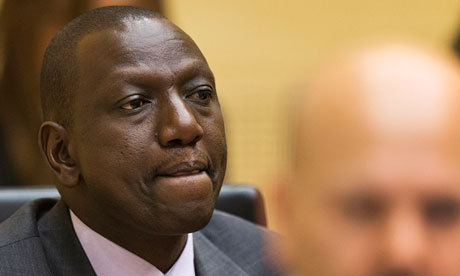By: Dan Krupinsky
Impunity Watch Reporter, Africa
THE HAGUE, Netherlands — The trial of Kenya’s deputy president, William Ruto, began earlier this week, marking the first time that a serving government official has stood trial at the International Criminal Court (ICC).
Ruto faces charges of crimes against humanity, stemming from the aftermath of the 2007 Kenyan presidential election, when more than 1,100 people died. On Tuesday, he plead not guilty to all charges against him. Kenyan president, Uhuru Kenyatta, will be tried on the same charges in November.

Specifically, Ruto and Kenyatta are charged with murder, deportation and persecution of political opponents in the Rift Valley region in late 2007 and early 2008, following the disputed election.
Kenyatta and Ruto, who teamed up to win the most recent election, were political rivals at the time, with Kenyatta being a prominent member of the Kikuyu ethnic group while Ruto was a leader of the Kalenjin group.
Following the election, ethnic clashes across the nation resulted in the deaths of over 1,100 people and the displacement of some 600,000 more, and were said to be the work of Ruto and his co-defendant, Joshua arap Sang, an influential radio executive.
“The crimes of which Mr. Ruto and Mr. Sang are charged were not just random and spontaneous acts of brutality,” said the ICC’s chief prosecutor, Fatou Bensouda, in court. “This was a carefully planned and executed plan of violence. Ruto’s ultimate goal was to seize political power for himself and his party in the event he could not do so via the ballot box.”
Ruto is accused of arming and organizing the attackers, while Sang’s role, according to the prosecution, was fostering hatred against Kikuyu tribe members through his radio show and broadcasting coded instructions about where to attack.
“It is difficult to imagine the suffering or the terror of the men, women and children who were burned alive, hacked to death or chased from their homes by armed youths,” Bensouda said.
Even after the Kenyan parliament voted last week to withdraw from the court, Ruto appeared voluntarily for the start of the trial, and continues to cooperate.
Ruto’s principal defense counsel, Karim Kahn, asserts that the charges against Ruto “[will] be shown to be patently false.”
“One cannot escape the reality that this investigation has been exceptionally deficient,” he said.
The legitimacy of the case is already being called somewhat into question, as prosecutors claim that witnesses have been afraid to testify, recanted their testimony after accepting money and in some cases, even killed.
The trial will resume Tuesday, September 17, when the prosecution will start presenting witnesses in a first session, which ends October 4. The second session is scheduled from October 14 to November 1.
For further information, please see:
All Africa – First Prosecution Witness to Testify Tuesday – 12 September 2013
BBC – Kenya’s William Ruto formed an army for war, ICC hears – 10 September 2013
The Guardian – Kenya’s deputy president William Ruto denies murder at ICC – 11 September 2013
New York Times – Deputy President of Kenya Goes on Trial in The Hague – 10 September 2013
ICC Decision on the Confirmation of Charges